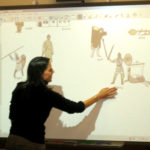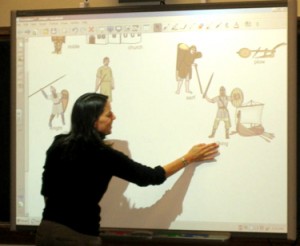
Contrary to popular opinion, newer teachers aren’t any more likely to use technology in their lessons than veteran teachers, and a lack of access to technology does not appear to be the main reason why teachers do not use it: These are among the common perceptions about education technology that new research from Walden University’s Richard W. Riley College of Education and Leadership appears to dispel.
Prepared by Grunwald Associates based on a 2009 survey of more than 1,000 teachers and administrators conducted by Eduventures Inc., the study argues that the more K-12 teachers use technology, the more they recognize its potential to help boost student learning and engagement and its connection to developing key 21st century skills.
There is still considerable disparity in the amount of time that teachers spend using technology as an instructional tool, the study says. Twenty-two percent of teachers reported frequent technology use (31 percent or more of their class time using technology to support learning), 17 percent said they were moderate users (21 to 30 percent of their class time using technology), 26 percent were sporadic users (11 to 20 percent of their class time using technology), and 34 percent were infrequent users (10 percent or less of their time).
Elementary school teachers were much less likely than secondary teachers to be frequent technology users; 15 percent of elementary teachers were frequent users and 43 percent were infrequent users, compared with 27 percent and 29 percent of secondary teachers, respectively. Among secondary teachers, social studies teachers were most likely to be frequent technology users (33 percent), while English teachers were least likely (16 percent).
In a finding that might surprise some people, younger teachers who are newer to the profession were no more likely to use technology than teachers with 10 or more years of experience, the study found. “Newer teachers might very well use technology more in their personal lives, but when it comes to frequency of technology use in classrooms, they don’t seem to have any edge over veteran teachers,” the report notes.
Don Knezek, CEO of the International Society for Technology in Education, said this finding is supported by his own experience in talking with school administrators. Administrators tell him “they don’t have to convince new teachers to check their eMail any more,” Knezek said—but they’re still not integrating technology any more frequently in their instruction.
There could be two reasons for this, Knezek added: Either they are coming out of teacher preparation programs unprepared to integrate technology effectively, or they’re entering a school environment where they’re not encouraged to do so.
Another finding that could surprise some people is that a lack of access to technology doesn’t appear to be the main reason why teachers don’t use technology in their instruction. Only 29 percent of the teachers who said they used specific technology devices less than once a week in their classrooms cited lack of access as the primary reason, while 49 percent said the devices in question weren’t necessary for their lessons.
Infrequent technology users do emphasize so-called 21st-century skills such as problem solving, critical thinking, communication, and collaboration in their instruction, the reports says—but frequent technology users place even more emphasis on these skills and report that technology has a positive impact on these skills in greater numbers.
“The difference between infrequent and frequent technology users’ emphasis on and perceived benefits of 21st-century skills raises interesting questions: Which comes first? Do teachers use technology frequently because they are trying deliberately to foster 21st-century skills? Or are 21st-century skills necessary conditions, byproducts, or logical outcomes of frequent technology use?” the report asks.
“It is not possible to determine causation from the survey results,” the report continues, “but it is clear that frequent technology use is associated with greater emphasis on and perceived benefits of 21st-century skills.”
The close correlation between the degree of emphasis placed on 21st-century skills in the classroom and the perceived effects of technology on these skills was based on a survey question that asked teachers to rate how much of an effect they think technology use has had on their students’ development of 21st-century skills, with 1 being no effect and 5 being the most effect.
In self-reporting their perceptions of how much of an effect technology has had on these skills, respondents might have been looking to justify, to themselves or the researchers, why they use technology in their classrooms or do not, acknowledged Peter Grunwald, president of Grunwald Associates.
But “we do think the degree of association is pretty impressive,” said. “Also, it is worth noting that some teachers may be using technology because they were required to, and yet still appear to view technology as having a positive impact on a variety of 21st-century skills.”
In other findings from the survey, both teachers and administrators believe technology helps engage many different types of students, including high- and low-achieving students; administrators believe that teachers are using technology to support learning more than teachers say they do; and most teachers do not believe their pre-service education programs prepared them well to integrate technology into their classrooms or teach 21st-century skills.
Links:
“Educators, Technology, and 21st Century Skills: Dispelling Five Myths.”
Walden University’s Richard W. Riley College of Education and Leadership


Comments are closed.